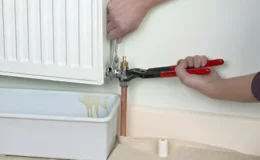
A must-have list of Safety Certificates for Landlords in the UK
Your landlord has the responsibility of ensuring the place in which you reside is safe and free of any hazards that may injure or harm your health. A landlord, before offering a property for rent must comply with government and local authority regulations. If they don’t, they run the risk of being prosecuted in the event of an accident that’s proved to be caused by negligence on behalf of the landlord.
We’ve compiled a complete list of safety certificates for landlords in the UK, which is a must-have before renting out a property. A tenant can request a copy of each safety certificate, which is proof that the landlord is operating a duty of care.
All tenants should cooperate with their landlord to ensure that all essential safety certificate checks are carried out regularly.
A required list of safety certificates for a rented property
Landlords must provide a variety of safety documents that prove a thorough safety inspection has been completed on all things electrical, gas or structural related to a property. Landlord certificates must be provided to both new and current tenants at the time of tenancy renewal. Should a landlord fail to comply with the legal regulations and allow a safety certificate to lapse, it could result in prosecution and a hefty fine, if the tenants suffer any injuries as a result!
A landlord must be able to produce the following valid certificates to demonstrate compliance with regulations:
- Gas safety certificate
- Electrical safety certificate
- Boiler installation certificate
- Energy Performance Certificate
- Legionella risk assessment
- Fire safety risk assessment
- PAT (Portable Appliance Testing)
Gas safety certificate
Landlords are required by law to have every gas appliance, pipelines and flues inspected by a Gas Safe engineer every 12 months. New tenants must be given a copy of the CP12 certificate when they take up the tenancy. This document outlines the checks that have been conducted and any recommendations for remedial works. A copy of the certificate should also be provided to the tenants within 28 days upon completion of the inspection. Furthermore, all checks must be archived for a minimum of two years.
Along with the above gas safety certificate, there are 2 other safety certificates related to commercial rental properties. They are popularly known as the CP17 safety certificate for commercial buildings and the CP42 safety certificate for commercial kitchens and restaurants.
Electrical safety certificate
The Electrical Safety Standards Regulations in the Private Rented Sector (England) 2020, which govern electrical safety in rented premises, came into effect on July 1, 2020. Now under the new regulations, there will be inspections and certifications every five years, which adds an extra layer of safety to the tenants. Privately rented buildings and Houses of Multiple Occupancy (HMOs) now come under this legislation.
Electrical Installation Condition Report (EICR), can only be completed by a certificated electrician. In addition, a copy of the electrical safety certificate must be given to the existing tenants within 28 days. As for new tenants, they must be provided with a copy the day their tenancy begins. Also, any corrective work needed must be completed within 28 days (or sooner) after the date of the report.
Beginning on July 1, 2020, new tenancies in England and existing tenancies (from April 1, 2021) are subjected to the new legislation. A property’s fixed electrical installations such as wiring, plug sockets, light fixtures, and the fuse box will be examined. As for electrical appliances like fridges, washing machines, toasters, microwaves, TV’s etc (all appliances provided by a landlord), should be in safe working order. A PAT (Portable Appliance Testing) test will verify an appliances condition. A PAT test is not a legal requirement but does demonstrate a landlord’s duty of care towards tenants. If or when a tenancy changes it is advised the appliances are PAT tested once more.
Based on the size of property, you may anticipate to pay between £150 to £300 for an EICR and approximately £50 to £80 for PAT testing.
Boiler installation certificate
Tenants have the right to know that the gas boiler and other gas appliances in the property have all been installed correctly and registered with the Gas Council as per building regulations. If you are renting a property you need to check the boiler installation certificate for peace of mind. The landlord should be able to provide you with a copy of the certificate to confirm the installation complies with regulations. Should a landlord refuse to provide a Boiler Installation Certificate, they may be subject to an investigation and or a fine.
All boiler installations in England and Wales, have to be registered at the Local Authority in compliance with Building Regulations. It’s a legal requirement for the landlord to do so. Once the boiler installation is completed, it may take a couple of weeks for the Boiler Installation Certificate to be received.
Are gas boilers going to be banned in the UK?
Read our article on Boiler Legislation’s Impact on the Gas and heating Industry.
Energy Performance Certificate
Usually landlords must present an Energy Performance Certificate (EPC) to the prospective tenants either at the property viewing or before signing the tenancy agreement. The EPC analyses a property’s energy efficiency and can help tenants to budget their spend on energy consumption. To rent a property, a landlord must have a “pass grade” of an E rating. Failing to present an EPC can result in a fine of up to £5,000. After several years, you may reapply for an EPC if you’ve made energy saving alterations to your home, such as installing double glazing or cavity wall insulation.
Legionella risk assessment
Water pipes and air conditioning systems are common breeding grounds for Legionella bacteria, which can cause Legionnaires’ disease. Under the Control of Substances Hazardous to Health Regulations (2002), landlords have a moral duty to conduct a risk assessment for Legionella in a rented property. In order to conduct a Legionella risk assessment, landlords should follow the advice provided by the Health and Safety Executive.
Fire safety risk assessment
A fire safety certificate is no longer issued in the UK. However, landlords must still adhere to a variety of fire safety rules, such as:
- smoke alarms should be installed on every landing within the property where tenants are billeted.
- Carbon monoxide alarms positioned in every room where a wood stove or open fire is being used. This will monitor any CO fumes and prevent any harmful effects.
- Ensure that all alarms are operational prior to the commencement of a new tenancy.
- Ensure that all offered furniture complies with fire resistance standards as per the Furniture and Furnishing (Fire) (Safety) Regulations 1988.






